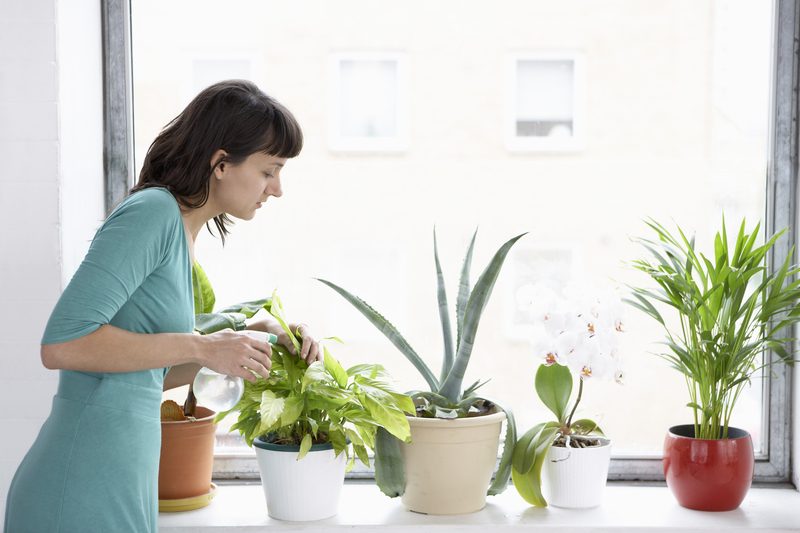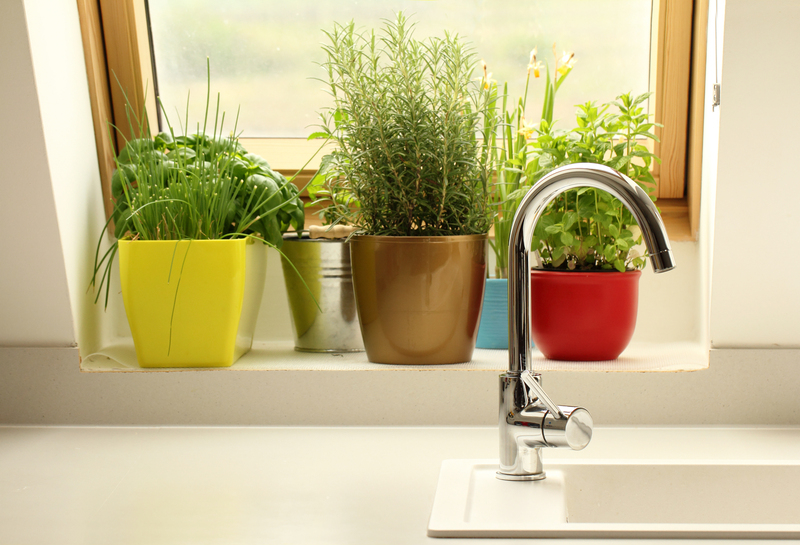Mastering the Art of Herb Gardening
Posted on 02/07/2025
Mastering the Art of Herb Gardening: Your Comprehensive Guide
Are you ready to cultivate your own thriving herb garden? Whether you're a beginner or a seasoned green thumb, mastering the art of herb gardening is both rewarding and surprisingly simple when armed with the right knowledge. In this comprehensive guide, we'll unravel the secrets to creating lush, aromatic, and productive herb gardens, transforming your outdoor or indoor spaces--and your cooking--forever.
Why Herb Gardening is Worth Your While
Herb gardening is more than just a hobby; it's a way to infuse your life with fresh flavors, natural remedies, and beautiful greenery. When you grow your own herbs, you gain access to the freshest ingredients, free from pesticides and preservatives. Plus, the act of gardening itself fosters mindfulness and stress relief, connecting you to the rhythms of nature.
- Freshness: Homegrown herbs offer unbeatable flavors and aromas.
- Health Benefits: Many herbs possess medicinal properties and are rich in antioxidants.
- Cost-Effective: Growing herbs at home saves money compared to buying pre-packaged varieties.
- Eco-Friendly: Fewer food miles and minimal packaging make herb gardening a sustainable choice.
- Aesthetically Pleasing: Herbs add beauty and fragrance to gardens, patios, and windowsills.

Understanding the Basics: What Is Herb Gardening?
Herb gardening is the practice of cultivating a variety of herbal plants, such as basil, parsley, mint, rosemary, thyme, and many others. These plants are primarily grown for their culinary, aromatic, and medicinal uses. Unlike vegetable gardens, herb gardens require little space and can thrive indoors, on balconies, or in outdoor beds.
Different Types of Herb Gardens
Before you dig in, consider which style of herb garden best suits your needs:
- Container Herb Gardens: Perfect for small spaces or indoor gardening enthusiasts.
- Raised Bed Herb Gardens: Excellent for maximizing drainage and controlling soil quality.
- In-Ground Herb Gardens: Ideal for larger spaces or mixing herbs with other plantings.
- Vertical Herb Gardens: Save space and add visual interest to walls and fences.
Planning Your Herb Garden Like a Pro
Choosing the Right Location
Sunlight is essential for most herbs. Most culinary herbs such as basil, oregano, thyme, and rosemary require at least 6 hours of direct sunlight per day. If you are gardening indoors, select a south-facing window or use grow lights to provide adequate light.
- Outdoor Gardens: Look for a spot that is sunny and sheltered from strong winds.
- Indoor Gardens: Place pots on sunny windowsills or beneath LED grow lamps.
Soil and Drainage
Herbs prefer well-draining soil with a pH between 6.0 and 7.0. Poor drainage can cause root rot and other health issues.
- Use: A quality potting mix blended with compost or perlite.
- Avoid: Heavy clay or overly sandy soils unless amended.
Selecting Your Herbs
When beginning your herb gardening journey, select herbs that match your growing conditions and culinary preferences. Some easy-to-grow and popular options include:
- Basil: All-purpose herb, loves warmth.
- Mint: Vigorous and refreshing, best in containers due to its invasiveness.
- Parsley: Hardy biennial, adaptable to sun or partial shade.
- Chives: Mild onion flavor, very hardy.
- Rosemary: Drought-tolerant once established, loves the sun.
- Oregano & Thyme: Mediterranean herbs, well-suited to sunny, dry spots.
Starting Your Herb Garden: Step-by-Step Guide
1. Deciding Between Seeds and Starter Plants
Both herb seeds and young starter plants, also called transplants, offer great results. Seeds are more economical and provide a wider selection, whereas transplants save time and offer instant satisfaction.
- For beginners: Starter plants are easier and provide quicker harvests.
- For variety and savings: Growing from seed gives you more options and lower costs.
2. Planting Your Herbs
Each herb has unique growing requirements, but most follow these basic steps:
- Prepare the soil by loosening it and mixing in compost for nutrients.
- Plant seeds or transplants at the recommended spacing, usually 8-12 inches apart.
- Water thoroughly after planting, keeping soil consistently moist until established.
3. Caring for Your Herb Garden
- Watering: Most herbs prefer to dry out slightly between waterings. Overwatering is a common mistake!
- Mulching: Apply a thin layer of organic mulch to conserve moisture and suppress weeds, keeping it away from stems.
- Feeding: Fertilize herbs lightly every 4-6 weeks with a balanced, organic fertilizer, but don't overdo it--excess nutrients can dilute flavors.
- Pruning: Regularly harvest and pinch back herbs to promote bushy, healthy growth.
Common Pests & Problems--and Their Solutions
Even the best-managed herb gardens can suffer from pests or diseases. Here's how to protect your plants:
- Aphids & Spider Mites: Rinse off with water or use insecticidal soap.
- Whitefly: Encourage natural predators like ladybugs, or use yellow sticky traps.
- Powdery Mildew: Ensure good air circulation and avoid wetting the leaves.
- Root Rot: Use well-drained soil and don't overwater.
Maximizing Herb Harvests: How and When to Pick
Learning how to properly harvest herbs is critical to getting the most from your herb garden. Regular harvesting encourages new growth and prevents flowering, which can make many herbs tough or bitter.
- Basil: Pinch leaves from the top, just above a pair of leaves to encourage branching.
- Mint: Cut stalks back to just above the soil to promote lush new shoots.
- Parsley: Snip outer stems close to the ground first.
- Rosemary & Thyme: Trim stems as needed, but don't cut into woody sections.
Tip: Harvest in the morning, after the dew has dried but before the heat of the day, for peak flavor and aroma.
Drying & Preserving Your Herbs
Don't let your fragrant harvest go to waste! Preserve herbs by air-drying, dehydrating, or freezing for year-round use.
- Drying: Tie small bunches and hang in a warm, shady place--avoid direct sun to retain color and flavor.
- Freezing: Chop herbs and freeze in ice cube trays with water or oil for instant flavor bombs.
- Infusing: Make herbal vinegars, oils, or butter for unique culinary creations.
Herb Gardening Indoors: Year-Round Freshness
Indoor herb gardening puts fresh herbs at your fingertips all year long, even in small apartments or during winter months.
- Choose compact, bushy herbs: Basil, parsley, cilantro, chives, thyme, and oregano thrive indoors.
- Light is key: Position herbs in the brightest window or under a full-spectrum grow light for at least 12-16 hours per day.
- Container drainage: Use pots with drainage holes to prevent waterlogging.
- Humidity & temperature: Most herbs prefer temperatures between 65-75?F and enjoy occasional misting.
DIY Indoor Herb Garden Ideas
- Windowsill gardens: Line up several small pots for a miniature herb oasis.
- Hanging planters: Save surface space and create eye-catching displays.
- Mason jar gardens: Add rustic charm and grow smaller herbs in jars with gravel at the bottom for drainage.
Companion Planting with Herbs
Mastering the art of herb gardening also means discovering which herbs to plant together--and which to keep apart. Companion planting helps deter pests and can boost the growth and flavor of both your herbs and vegetables.
- Basil: Great companion for tomatoes, repels whiteflies and aphids.
- Parsley: Loves being near chives, carrots, and roses.
- Thyme: Plant near cabbage to deter cabbage worms.
- Mint: Plant in containers to prevent it from taking over garden borders, but its fragrance repels ants and cabbage moths.
Troubleshooting: Overcoming Common Herb Gardening Challenges
- Leggy plants: Usually a sign of insufficient light.
- Yellow leaves: Often due to overwatering or poor drainage.
- Slow growth: Ensure herbs aren't root-bound in containers and fertilize lightly.
- Bolting: Many annual herbs like cilantro and basil bolt (flower and go to seed) in hot weather; try to harvest regularly and provide some afternoon shade in hotter climates.
Creative Ways to Use Your Homegrown Herbs
Once you've mastered herb gardening, put your herbal bounty to use!
- Infuse oils and vinegars for gourmet flavors.
- Brew herbal teas for relaxation and wellness.
- Make aromatic sachets to scent drawers and closets.
- Create herbal balms and salves for natural skincare solutions.
- Decorate dishes with fresh sprigs of parsley, basil, or chives.

Take Your Herb Gardening to the Next Level
Mastering the art of herb gardening doesn't stop with a single harvest. Experiment with less common herbs like lemon verbena, sorrel, stevia, and shiso. Try growing from cuttings or propagate your own seeds. Share your bounty or swap plants with fellow gardeners to expand your collection and knowledge.
Joining the Herb Gardening Community
Connect with local garden clubs, join online forums, or participate in seed swaps to continue learning and enjoying all that herb gardening has to offer.
Conclusion: Become a Herb Gardening Master
From choosing the perfect spot and herbs to harvesting, preserving, and savoring your harvest, mastering the art of herb gardening is a journey that brings beauty, health, and flavor to daily life. Dive in, get your hands dirty, and let this ancient, delicious pastime enhance your well-being and home.
Are you ready to start your own herb garden? With these tips for successful herb gardening, you're well on your way to becoming a master of the herb patch!
Latest Posts
Crafting a Safe and Fun Outdoor Space for Children
Exploring the Artistry in Hedge Trimming Shapes and Techniques
3 Proven Tips to Tackle Weeds and Maintain a Healthy Lawn

